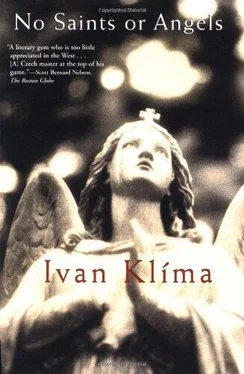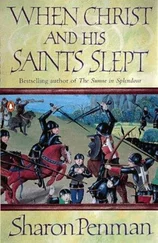We get out.
'Mum, you're white as a sheet. Are you all right?'
'It'll pass,' I say. I feel like screaming and demanding the names of those bastards, then I'd get hold of a pistol and shoot the lot! And I'd save the last bullet for myself for being such a rotten mother.
We are sitting in a bar-room that is already full of smoke at this time of the morning and drinking lousy coffee. I'd like her to give me a moment to get my breath back, but she is unstoppable.
'In the end nothing else mattered to me,' she says about her drug-taking. 'I was even prepared to steal. We systematically stole everything we could: from shops, from the market. I stole stuff from you too, but you know about that. And then I couldn't care less about anything, whether I went to school or whether they caught me and locked me up. I didn't think about anything that was going to happen on a particular day, just about getting my fix.'
I know about it from hearsay and films, and I've read about it, but the thought that my little girl went through all that and that I lived alongside her and suspected nothing and refused to entertain the possibility, that I even left her on her own so that I could be with my lover, hurts me as if someone were driving nails into me. I'm still the same as I always was. I wait here motionless and unprepared until someone places the nail against my chest, raises the hammer and strikes. In exactly the same way I refused to accept that my former — and as of now, late — husband was unfaithful to me. I tried to convince myself that nothing like that could happen to me, that such misfortunes only happen to other people.
My little girl goes on to describe to me the horrors of abstinence and how she was ready to run away the whole time. 'But now I can appreciate,' she says, using a word that is out of character for her, 'that I was only wanting to run away from life and escape everything that was bothering me. At home and at school. Everything. And also I'm beginning to understand Dad and you. I'll tell you both about it some time.'
'You won't be able to tell Dad any more.'
'But I can tell you. I'll analyse you. You're the person who matters most to me. When you appreciate what you're doing wrong and understand your weak points, you can live differently and be happy,' she says, repeating the lecture she has just heard.
When we arrive home she rushes into her bedroom, leaps on to the divan and shouts, 'My old bed, my old Bimba, my old drum kit — I've really missed you!'
'The times you could have been here,' I tell her, 'you couldn't leave the house fast enough.'
'Because I was unhappy here,' she explains.
I hug her. I hold her tight. My little girl, what made you do it all; I loved you so much, after all; I didn't have anyone else; I don't have anyone else but you.
While we're getting changed she assures me that only now will she be able to appreciate me for what I am and appreciate being at home. She talks quickly, as is her wont, and with the same earnestness as when she asked a moment ago whether she should take a red ribbon instead of a black one.
We call in for my mother on the way. She notices that my eyes are red from weeping and comments that the man isn't worth my tears after ruining my life.
We ruined our own lives, I don't say to her.
At the crematorium the master of ceremonies sits the three of us in the first row of benches. Alongside the coffin, which I chose, there lie three wreaths. One is on Jana's behalf and one was sent by his old school. The label on the third one has curled up and I can't read it. Maybe someone loved him after all towards the end of his life and sent him a wreath.
The principal of the school, where my former husband, now in a coffin, taught until recently, steps up to the lectern. He makes a bow to the catafalque and then with fervour starts to declaim about a man who loved his profession and sacrificed his spare time to his pupils, who was always reliable and never harmed anyone.
My mind goes back to the last conversation I had with the man I once loved and admired and who strangely is now lying in a coffin that I chose; now he knows nothing about those of us who have been left here a divine blink longer — out of the kindness of passing time.
Did he discover something important at the end of his life that he wanted to share with me, something I could even tell our daughter? Time in place of God, Time that is eternal, infinite and incomprehensible. Does that mean we ought to pray to Time?
Except that time is indifferent to our fate. Time is awful but it is also the only just thing in the world. It lets us reach places like this where we are finally levelled. But before we end up here we can experience something and do something with our lives and it leaves it up to us what we do. It lets us ruin what we like. Time or God, it makes no difference what we call it.
The organist now plays the opening passage of Ryba's Christmas Mass — I had to bring a copy of it, because it's not in the usual funeral repertoire. I close my eyes and lean against the white wall of the Rožmitál cemetery. My one and only husband is standing next to me, alive and smiling at me: 'Why so sad, Kristýna?'
I'm not sad, I'm just dreadfully tired.
2
I'm already in bed when the phone rings. Mum asks with a frail voice whether she's woken me up. 'Are you all right, Mum?'
'I don't know,' Mum says. 'I've got one of those heavy nosebleeds again and it won't stop.'
I panic and tell her I'll be right over and in the same frail voice Mum apologizes for bothering me.
Blood is waiting for me as I open the door. It is on the front hall floor and on the carpet in the bedroom where Mum is sitting on her bed, deathly pale.
One oughtn't to treat one's relatives. I place some ice on the nape of her neck and tell her I'm taking her to hospital. Mum tells me she's not going to any hospital; if she's going to die, she'd sooner die at home.
'What are you talking about, Mum? People don't die from nosebleeds.'
'You can die from anything.'
'If you have a mind to.'
She tells me she doesn't have a mind to and says she's feeling better already. The nosebleed came on when she was asleep and she just panicked a bit when she saw all the blood around her. She is sorry she bothered me.
I know it would be hard to persuade her and anyway it really does look as if the bleeding is stopping. So I go and make her a cup of tea at least, and stir in a few spoonfuls of honey. Then I wipe the blood off the floor, change Mum's bed linen and help her into a clean nightdress.
'I'm not keeping you, am I?' she frets.
'No, don't worry, I didn't have any other plans.' I sit down by her and take her hand.
'Not even a date?'
'Not even a date.'
'But I expect you're wanting to get on with some work.'
'I've had enough work during the day. Now I'm going to stay here with you.'
'You don't have to. I'm better now.'
'I'd be on my own at home anyway.'
'I know,' Mum says. 'But what sort of company am I for you?'
'The best, Mum.'
'You don't have to pretend anything to me. But you oughtn't to be on your own all the time. Not now that Karel's gone.'
'Mum, you've forgotten that we've been apart for years.'
'I haven't forgotten. But you waited for him all the same.'
I don't feel like talking about it. I don't feel like talking about anything.
'It's a long time since I did.'
'Exactly. You've been on your own too long. Everything's on your shoulders and it's wearing you out.'
'I'd sooner be on my own than have someone hanging round my neck.'
'Do you mean that young man you told me about?'
'I didn't mean anyone in particular.'
'And what about him? Does he love you?'
'I don't know.'
Читать дальше












